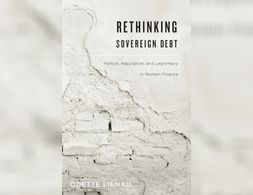✕
385 results
This text provides an easy to understand introduction to complexity economics for non-specialist audiences such as bachelor's students.
Post-Keynesians focus on the analysis of capitalist economies, perceived as highly productive, but unstable and conflictive systems. Economic activity is determined by effective demand, which is typically insufficient to generate full employment and full utilisation of capacity.
Approaching the law of nature that determines all forms of economy. The bulk of economic theory addresses the economic process by setting out on a catalogue of aspects, seeking the laws in the aspects and hoping to get together a reliable view of the whole.
In this essay the author reviews empirical studies in economics that analyze factors behind the rise of nationalist and populist parties in Western countries. He stresses that economic factors (e.g., trade shocks and economic crisis) play a crucial role in the rise of populist parties; however, the discussion of mechanisms driving this trend remains unsatisfying
In the history of the social sciences, few individuals have exerted as much influence as has Jeremy Bentham. His attempt to become “the Newton of morals” has left a marked impression upon the methodology and form of analysis that social sciences like economics and political science have chosen as modus operandi.
By conducting a discourse analysis (SKAD) in the field of academic economics textbooks, this paper aims at reconstructing frames and identity options offered to undergraduate students relating to the questions ‘Why study economics?’ and ‘Who do I become by studying economics?’. The analysis showed three major frames and respective identity offerings, all of which are contextualized theoretically, with prominent reference to the Foucauldian reflection of the science of Political Economy. Surprisingly, none of them encourages the student to think critically, as could have been expected in a pedagogical context. Taken together, economics textbooks appear as a “total structure of actions brought to bear upon possible action” (Foucault), therefore, as a genuine example of Foucauldian power structures.
With the onset of an economic crisis that has been universally acknowledged since the end of March, two main questions arise: To what extent is the corona pandemic the starting point (or even the cause) of this crisis? And secondly: can the aid programmes that have been adopted prevent a deep and prolonged recession?
The article pursues the two related questions of how economists pretend to know and why they want to know at all. It is argued that both the economic form of knowledge and the motivation of knowing have undergone a fundamental change during the course of the 20th century. The knowledge of important contemporary economic textbooks has little in common with an objective, decidedly scientifically motivated knowledge. Rather, their contents and forms follow a productive end, aiming at the subjectivity of their readers.
This paper starts with an evaluation of three common arguments against pluralism in economics: (1) the claim that economics is already pluralist, (2) the argument that if there was the need for greater plurality, it would emerge on its own, and (3) the assertion that pluralism means ‘anything goes’ and is thus unscientific. Pluralist responses to all three arguments are summarized. The third argument is identified to relate to a greater challenge for pluralism: an epistemological trade-off between diversity and consensus that suggests moving from a discussion about ‘pros’ and ‘cons’ towards a discussion about the adequate degree of plurality. We instantiate the trade-off by showing how it originates from two main challenges: the need to derive adequate quality criteria for a pluralist economics, and the necessity to propose strategies that ensure the communication across different research programs. The paper concludes with some strategies to meet these challenges.
Deforestation is estimated to be responsible for about 12-29% of global greenhouse gas emissions. This essay will explore ecological economics as an alternative lens through which to approach forest conservation and the acceleration of climate change.
It is perhaps fitting that the seriousness of the coronavirus threat hit most of the Western world around the Ides of March, the traditional day of reckoning of outstanding debts in Ancient Rome. After all, problems and imbalances have accumulated in the Western capitalist system over four decades, ostensibly since it took the neoliberal road out of the 1970s crisis and kept going along it, heedless of the crises and problems it led to.
Environmental catastrophe looms large over politics: from the young person’s climate march to Alexandria Ocasio-Cortez’s Green New Deal, increasing amounts of political space are devoted to the issue. Central to this debate is the question of whether economic growth inevitably leads to environmental issues such as depleted finite resources and increased waste, disruption of natural cycles and ecosystems, and of course climate change. Growth is the focal point of the de-growth and zero-growth movements who charge that despite efficiency gains, increased GDP always results in increased use of energy and emissions. On the other side of the debate, advocates of continued growth (largely mainstream economists) believe that technological progress and policies can ‘decouple’ growth from emissions.
This course provides future change makers in public and private sectors with a comprehensive overview on the structures and actors that shape markets.
This article explores if power dynamics in the household can be changed, and if so, how. In this context the focus is laid on government childcare policy and its various channels of possible influence.
A historical glimpse of how economists of the 19th century debated the usefulness of mathematics to economics
Shadow banking became one of the main features of modern market based financial capitalism and financial globalisation. Daniel Gabor locates this development in a Super-Cycle framework and sketches out opportunities to launch a new cycle that is green and just through financial regulation and publicly organised sustainable finance.
Exploring Economics Dossier on the economic fallout of the COVID-19 pandemic and the structural crisis of globalization. COVID-19 encounters a structural crisis of globalization and the economic system that drives it, with an uncertain outcome. We asked economists worldwide to share with us their analysis of current events, long-term perspectives and political responses. The dossier will be continuously expanded.
This self-paced free course by Perry Merhling guides you to his "Money View" approach that integrates the fields of economics and finance. The course can easily be understood by people interested people without technical economic knowledge or training as it is primarily a tool for analysis.
Why do we think that sovereign debt must be repaid--even after a major regime change--in order to maintain country creditworthiness? In a fascinating and highly original book, Odette Lienau argues that this conventional wisdom is overly simplistic and in some respects entirely wrong.
In 18th century Europe figures such as Adam Smith, David Ricardo, Friedrich List and Jean Baptiste Colbert developed theories regarding international trade, which either embraced free trade seeing it as a positive sum game or recommended more cautious and strategic approaches to trade seeing it as a potential danger and a rivalry and often as a zero-sum game. What about today?
How can we establish new institutions and practices in order to use fare-free public transport as a beacon for sustainable mobility and a low-carbon lifestyle? The author of this essay elaborates on how practice theory and institutional economics can help to answer this question.
Feminist economics is a key component of the movement for pluralism in economics and one that has, to some extent, been acknowledged by the mainstream of the profession. It seeks to highlight issues which affect women because (it claims) they have not traditionally been recognised in a field dominated by men. On top of this, it seeks to carve out a space for women in the discipline, both for intrinsic reasons of fairness and diversity and because it means that women’s issues are more likely to be highlighted going forward.
This article reviews insights of existing literature on global care chains. A specific focus is laid on the impact that the refugee crisis has on global care chains and in turn how the crisis impacts the de-skilling of the women in the migrant workforce.
Here we look at the effect of the 2008 Climate Change Act passed in Parliament in the United Kingdom as an effort to curb emissions in all sectors. The Act aside from setting goals to become a low-carbon economy sets up an independent committee on Climate Change to ensure the implementation of policies to comply with the ultimate goal of 80% reduction in total emissions in 2050. I make use of the Synthetic Control Method (SCM) to create a comparative case study in which the creation of a synthetic UK serves as a counterfactual where the treatment never occurred (Cunningham, 2018).
Firms are the primary places where economic activity takes place in modern capitalist economies: they are where most stuff is produced; where many of us spend 40 hours a week; and where big decisions are made about how to allocate resources. Establishing how they work is hugely important because it helps us to understand patterns of production and consumption, including how firms will react to changes in economic conditions and policy. And a well-established literature – led by post-Keynesians and institutionalists – holds that the best way to determine how firms work is to…wait for it...ask firms how they work. This a clearly sensible proposition that is contested in economics for some reason, but we’ll ignore the controversy here and just explore the theory that springs from this approach.
How countries achieve long-term GDP growth is up there with the most important topics in economics. As Nobel Laureate Robert Lucas put it “the consequences for human welfare involved in questions like these are simply staggering: once one starts to think about them, it is hard to think about anything else.” Ricardo Hausmann et al take a refreshing approach to this question in their Atlas of Economic Complexity. They argue a country’s growth depends on the complexity of its economy: it must have a diverse economy which produces a wide variety of products, including ones that cannot be produced much elsewhere. The Atlas goes into detail on exactly what complexity means, how it fits the data, and what this implies for development. Below I will offer a summary of their arguments, including some cool data visualisations.
Economic sociology is an entire subfield and one could write an series on it, so I’m going to stick to probably the most prominent economic sociologist and the founder of ‘new economic sociology’, Mark Granovetter.
Exploring Economics, an open-source e-learning platform, giving you the opportunity to discover & study a variety of economic theories, topics, and methods.
An essay of the writing workshop on Nigeria’s Readiness for and the Effect of the Fourth Industrial Revolution
An essay of the writing workshop on Nigeria’s Readiness for and the Effect of the Fourth Industrial Revolution
It is fiercely debated when exactly the growth set off and what the drivers of Indian growth were. Scott Alexander summarises some of the recent literature on this question, demonstrating that not only the liberalisation policies of the 90s might be the driver of the take-off, but potentially public investments, political developments or cultural shifts.
From the two premises that (1) economies are complex systems and (2) the accumulation of knowledge about reality is desirable, I derive the conclusion that pluralism with regard to economic research programs is a more viable position to hold than monism. To substantiate this claim an epistemological framework of how scholars study their objects of inquiry and relate their models to reality is discussed. Furthermore, it is argued that given the current institutions of our scientific system, economics self-organizes towards a state of scientific unity. Since such a state is epistemologically inferior to a state of plurality, critical intervention is desirable.
We use cookies on our website. Click on Accept to help us to make Exploring Economics constantly better!
































